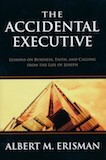Working for God’s Best
Blog / Produced by The High Calling
Mark comes home from another exhausting night in the pediatric emergency room. In his mind he reviews the children’s faces, the difficult cases, the pained parents, and the good that he and his medical team were able to accomplish. It was a very hard night and yet a fulfilling night for all of the comfort and healing he was able to administer.
There is however, a persistent and nagging voice regularly in his head. A voice offering a litany of thoughts that all but disqualify his achievements and satisfaction for the evening’s medical labors. “You’re missing God’s best…As a medical doctor you are simply excelling at “secular” work…You may be doing good things, but you’re not doing Kingdom work, you’re not in the Lord’s ministry.”
You see, even though Mark is a faithful follower of Jesus, he is conflicted about being merely a “healer” of kids' bodies instead of a shepherd of people’s souls. He still hears the voice of his now-deceased father ringing in his ears like ubiquitous church bells ringing. Mark’s father was a Baptist pastor who incessantly preached that in order to do work that mattered to the Lord—work that counted for eternity—one had to go into full-time Christian ministry. Unless you were a pastor or a missionary, you were missing God’s best.
Is Mark missing God’s best? Or are the noises in his head causing him to miss something more significant, more biblical?
Resurrection and Work
When it comes to the nature of work in light of the Gospel and life and eternity, Mark would do well to consider the Apostle Paul’s words on this matter: “Therefore, my beloved brothers, be steadfast, immovable, always abounding in the work of the Lord, knowing that in the Lord your labor is not in vain” (1 Corinthians 15:58). Immediately following his apologetic for the resurrection, the Apostle crowns the value of work.
Wait, do these verses mean that Mark’s work as a pediatrician is not in vain? Or is the Apostle simply referring to the work of evangelism or pastoral ministry?
The comprehensive word “always” would come to help our doctor friend here; this word seems to indicate that his work as a physician (not just the church work his father planned for him) is not in vain.
Actually, Mark did begin a journey of reorienting his life and categories as they related to ministry and “God’s best.” Mark came to realize that the resurrection (literal, physical, bodily) is the sign and proof that we are not just biding our time here on earth awaiting God’s best someday in heaven. The resurrection clearly demonstrates that the body matters and that what is physical is important to God. 1 Corinthians 15, a passage that long held only abstract theological significance for Mark, came to carry significant practical weight. Because Jesus bodily rose from the dead, Mark’s work, what he does 60 plus hours a week in a hospital, “is not in vain.”
Creation and Work
This drove our friend to another favorite part of Scripture growing up: the Creation account. How many times had he read or heard the beginning of Genesis expounded upon? However, the text was viewed only as an apologetic for Creation over against the secular evolutionary theories..
Mark began to see something else in these early Genesis chapters. Again, he perceived something much more practical and down to earth for his daily living and working. He observed that immediately after God created the heavens and the earth, he called on Adam and Eve, in essence, to get to work: “Here’s a garden, work it”; "Over there are the animals, lead them.” Physical work in a physical world cannot be designated as second class. Work, even work that seems not to have “religious” connotations, was God’s initial charge to man! Physical things matter; all work is of great value. In reality, all work is spiritual work. And Mark began to appreciate that God calls and equips people with the skills to meet the physical needs of His creation. So in working to meet the physical and even “temporal” needs of others, his work is fulfilling God’s design and is not in vain.
God’s Gift of Work
Mark began to wrestle with this notion of his giftedness, of his vocation. One more passage of Scripture would help inform him on his journey. This time he examined the words of Solomon, which in his upbringing were a polemic against “secular” living. Ecclesiastes was viewed as an argument about the futility of living life “under the sun.” But what Mark came to realize was that these were simply words of wisdom that describe the riddle that life truly is, and that God has given us our inscrutable lives (and even our work!) as gift to be enjoyed:
After looking at the way things are on this earth, here's what I've decided is the best way to live: Take care of yourself, have a good time, and make the most of whatever job you have for as long as God gives you life. And that's about it. That's the human lot. Yes, we should make the most of what God gives, both the bounty and the capacity to enjoy it, accepting what's given and delighting in the work. It's God's gift! (Ecclesiastes 5:18-19, The Message).
Oh my, what a fascinatingly new way to see his life and work! Mark was created to work, and for work, even medicine! Work is God's good gift to us! And through his work he can know God’s pleasure and design for his life.
As a pediatrician, is Mark missing God’s best? Is he compromising the sacred faith in which he raised? I think not. For he still confidently believes in the resurrection of Jesus and in so doing knows that his work is not in vain. He still holds to the doctrine of Creation, within which he finds his calling to work in very physical ways. And as a child of God, in the mystery of this life, he wisely believes that God has made him to be a doctor and to enjoy the task to which he has been called.
That is certainly God’s best!





